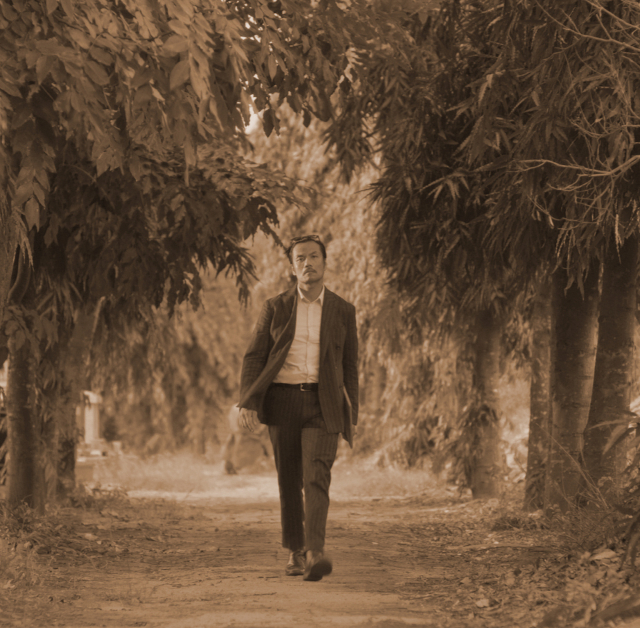WHO AM I? WHY AM I HERE?
WHAT IS THIS HERE? WHAT IS THIS I?
Artistic Statement
The ghostly thread of memory that binds today with yesterday is, for me, sometimes the most enduring character of change. To be sure, it is what allows us to make some sense of our lives—but, more profoundly, it shapes an inner world that inevitably collides with the external one. I know no other psychic haunting more indelible than the hidden memories that flutter toward the light from some forgotten corner of the mind. It has been—if not the most prolific source of stories for me—perhaps the most revelatory.
Sea Rose Ashes proves to be a film that follows this personal tradition. However, since it is a documentary (and my first foray into this form), as opposed to a narrative work, the extravagant reimagining of memories and perspectives consistent with all my narrative films is a treatment now dispensed with. In its place is a gradually crystallizing reckoning with the inescapable truths of my existence—first, in the narrow sense, and then in the broader one, where art and life fundamentally clash and mirror each other.

When John Coltrane’s “Polka Dots and Moonbeams” scratched softly at the walls of my mind and compelled me to circle around some inexplicable melancholy, it led me to my most personal narrative work, Sudden Stars in the Night Zoo. When a real-life half-brother continued to randomly resurface in my life as a mentally ill panhandler, it led me to explore the guilt and confusion with the film My Brother.
Near the end of 2019, at the height of heartbreak—having fallen madly in love with another woman while still deeply in love with the one I had been with for more than twenty years—real thoughts of suicide entered my mind for the first time. It was then that I walked a short few paces across the divide of memory and entered the room that I believe my mother and her killer, a former boyfriend, must have respectively found themselves trapped in. This room was a prison of doomed heartache, and at the center of the floor was an opened trapdoor to the chambers of narcissism, alienation, and forlornness—in other words, a perfect psychic cocktail for sociopathy. And even more succinctly: evil.
This stunning fall to the ground, after having been walloped by the sledgehammer of revelation, was the first tendril of a story that would become Sea Rose Ashes.
It is not an exaggeration to say that the genesis of my being was the tragedy of helplessly bearing witness to my mother’s murder. That moment formed a self that, like a Russian doll, contains all other selves. Thus, when I began having thoughts of killing myself, I had entered uncharted waters, and there I saw the two-headed sea monster that was my mother and her killer. I could see the clean, unimpeded slide from human to animal, from acceptance to rage, love to hate, nurturing to killing—and this glimpse into the existential abyss terrified me. It cast me into crushing self-doubt. I wondered if I would discover a self that was imminently capable of ending my own life. Or perhaps I would discover a self in some other buried layer of that Russian doll that was imminently capable of ending someone else’s.
Standing alone in this wasteland, I realized there was an interlocutor with whom my bewilderment could be shared: the man who murdered my mother. I needed to speak with him face to face—to ask why he did it. I wanted to hear it in his own words and look into his eyes, even if only for a fleeting moment, to find some recognizable glimmer of humanity. And even if what I might hear and see irrevocably confirmed for me the most abominable shape of the human being, I wanted this opportunity more than almost anything else I have ever wanted in my life.
Like much of what I have learned about my mother, my aunt, and the Vietnamese people I have known—when faced with a daunting mountain to climb—we begin by walking, one foot in front of the other, and wherever needed, we build roads and dig tunnels. I have been fortunate to inherit this sincere gumption and dignified tenacity. The road ahead leads to an unknown horizon, but by wandering and seeking the truth from the obscene father of my personal great tragedy, I hope to find the existential agency he stole from me as a child. If I am lucky, I will be triumphant in this “hero’s journey,” and the child and man within me will cease to tear at one another. They will see through the illusion of separateness and hatred. They will remember vividly that they are old friends.
I have given a name to this odyssey that I will share with whomever might listen: Sea Rose Ashes. If “story” is the ultimate human language that forms the nexus of social consciousness, then it is my hope that this particular story will be useful for all my friends and enemies alike.






